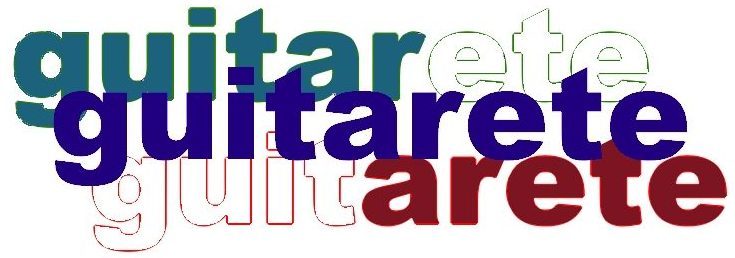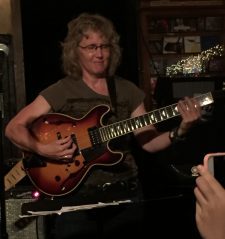I had the good fortune to catch the second set of the Sheryl Bailey Quartet’s February 2 performance at Fat Cat, in the West Village. In the same large NYC basement as dozens of people playing pool, ping-pong, Scrabble, table bocce, foozeball, and who-knows-what-else, guitarist-composer-leader Bailey guided pianist Jim Ridl, bassist Andy McKee, and drummer Sylvia Cuenca through a five-tune set of her originals.
Throughout the set, the band played with a clear, unexaggerated, almost-light-definitely-not-heavy attack. At no point do I recall them rising to a bashing, thunderous level. While their set was certainly not meditative, can-hear-a-pin-drop-in-space quiet, just as much it wasn’t a self-consciously loud set. They infused the set with energy, but without spending much time at the extremes. In this ensemble, that tendency, shared among all, did not result in anything that could be mistaken for middle-of-the-road background filler. I understood the avoidance of volume extremes as saying to those in the distraction-filled environment who chose to put the music first, “Stay focused! Listen The interesting stuff isn’t only at the extremes.”
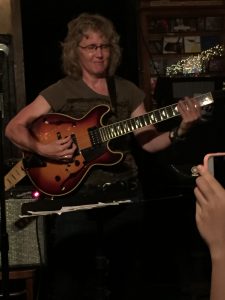
The set consisted, in order, of “An Unexpected Turn,” “Lazy Dazy,” “What She Said,” “Last Night,” and “Starbrite.” Bailey gave each number a brief introduction. Most memorable were her intros to “An Unexpected Turn” and “Lazy Dazy.” The former, she related, was inspired by unpredictable and creatively satisfying run-ins with NYC jazz cats, including her quartet bandmates. “Lazy Dazy,” Bailey said, came to her in the aftermath of a rare day off—something, as a self-described “type-A” personality who needs to “get shit done,” with which she’s not entirely comfortable. The tune, which is as yet not to be found on any of her albums, does conjure some discomfort; its A and B sections have a playful, but somewhat awkward relationship. It’s not difficult for me to imagine Bailey as constantly busy, not only from her involvement in numerous projects, but from my observation that every time I’ve been to one of her gigs as the leader, she has performed a new composition. I’ve come to expect and look forward to hearing her new and unrecorded tunes at her gigs.
“An Unexpected Turn, “What She Said,” and “Last Night” all appear on Bailey’s albums, but with different instrumentation. “What She Said” is from Departure, her 2017 duo recording with bassist Harvie S (the duo is called Plucky Strum), and was written for project. According to Bailey, and to my ears, it made a good “burner” for the quartet. The tune is a burner regardless of instrumentation; the recorded duo version clocks in at almost 230 beats-per-minute, although the quartet performance may have been noticeably faster. “An Unexpected Turn” and “Last Night” are both from Bailey’s superb 2015 organ trio recording A Meeting of Minds. Both have singable heads that opened into a succession of solos.
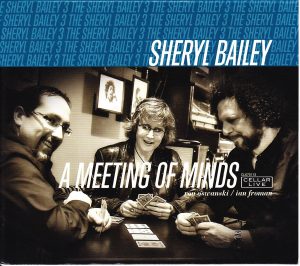
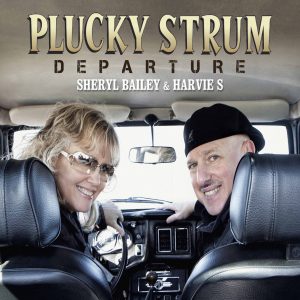
For the first three tunes of the set, Bailey soloed, followed by Ridl, and then by McKee. As the set developed, the conversation among the soloists became increasingly evident, with a subsequent soloist often echoing rhythmic figures from a predecessor’s solo. Technique was at a high level all around. Bailey can certainly create the sense of more than one voice at a time being played on a single guitar, not to mention really get going with single-not picking. Occasionally, she seasons her jazz soloing with surprises such as rock-influenced triplets and a solo entrance consisting of a series of reverse bends. Arrangement variations, such as the change in order of soloists on “Last Night” and the drum solo over an ostinato in the set-closing “Starbrite,” created a subtle motion across the individual tunes in the set.
Absent much (I don’t remember any) quick-succession “trading fours,” the depth of mutual listening among Bailey, Ridl, and McKee could easily be missed by a casual listener, especially given the quartet’s eschewing of loud drama. Those who followed the band’s example reaped the reward of hearing soloists listen to each other with mutual appreciation, comfort, and only the friendliest of competition. It was like listening to a witty conversation of consisting of clever points that avoided gross-outs, loud exclamations, and shock value. Those elements are often fun and great, but they can also be overdone. That Sheryl Bailey and her compatriots chose to define their place at Fat Cat by inviting listeners to choose them without demanding their attention showed devotion to and confidence in the jazz art form as good in itself and beyond the need for hype.
